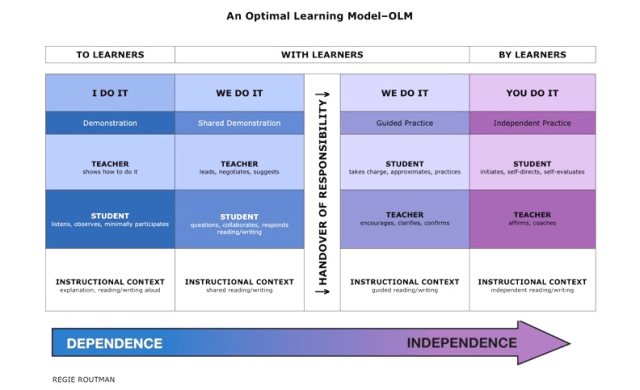
This summer I have been reading Read, Write, Lead: Breakthrough Strategies for Schoolwide Literacy Success by Regie Routman. This is a required reading for me for my new role as ITC.
Literacy is a word that has always intimidated me. I am a math teacher, my forte is definitely numbers. Teaching students “how to read” is not something that I feel is one of my strengths. Through my teaching career, I have realized that literacy does not just refer to how to see letters and turn them into words, but it is more about comprehension and application of what our students read that is important. This has made me feel more confident in teaching literacy, although I still consider myself far from an expert!
Literacy is about empowering our students to be able to accomplish their goals. I agree with Routman who states “if we just graduate students who have fulfilled requirements but lack curiosity and a desire and ability to be self-sustaining learners, we have failed” (p. 5).
Chapter 1 – Literacy and Leadership: Change that Matters
I love that this book starts with how to prepare a school for change. So much of what I have read in the past provides a lot of really good ideas without providing support and ideas on how to implement them effectively and for the long term.
Routman proposes steps that leaders can take to prepare for change and acknowledges that there are many great ways to implement change in your building. She stresses that relationships with staff and students are pivotal in implementing any type of change in a building and that a positive relationship that starts by focusing on what is done well will provide a strong base for growth when moving on to what can be worked on.
Chapter 2 – Responsive Instruction, Feedback, and Assessment
Routman defines responsive teaching and assessment as “teaching for understanding, continuously checking for understanding, and adjusting instruction as needed” (p. 37). We need to ensure that we are encouraging our students to move towards being more independent learners through effective feedback and planning with the end goal in mind, we often forget to consider what we want our students to be able to do at the end of a lesson or a unit. She also stresses insuring that we include real-world issues as well as skills, such as peer collaboration and active learning, as this increases student performance (p. 41).

Using Routman’s Optimal Learning Model (OLM), it is suggested that teachers need to ensure and reflect on the their teaching practice and determine if students are receiving enough of each level. It is also important to shift from part-to-whole teaching to whole-part-whole teaching. This shift involves moving from teaching a small subset of skills, working up to the final product to teaching the final product, addressing subset skills as needed by students. This allows students to demonstrate their prior knowledge as well take charge of their learning by having an image of the goal.
Feedback is another essential portion of the OLM but one of the hardest teaching skills to master. To ensure effective feedback, it must move students’ learning forward positively, be ongoing, and be provided in a timely manner. It is important to remember that feedback is a productive CONVERSATION, not notes written on an assignment and returned.
Reflection
The first two chapters of this book have helped me wrap my head around the idea of literacy as more than just learning how to read and how to start change in a building. I think that this is important for me as I move into two roles that are new to me next year (vice-principal and instructional team coach). It also has me reflecting on my practice as a teacher and where I am in implementing the OLM into my teaching.
I feel that, within the math classroom, I am fairly effective at the OLM as I often (but not always) provide examples I work, that we work, and they work before I assign practice questions for students. In other subjects, I need to work on this. In thinking about the Social 9 course I taught this past year, I could improve my OLM implementation by doing more read-alouds with the the group and explaining how to interpret the features of the textbook, by providing insight into how I decipher words I am not familiar with, and by modelling jot-note taking skills. Although I will not be teaching this course in the upcoming year, I think that these are things that I can implement into the Accounting 10 course I will be teaching in the second semester.
Feedback is an area that I worked on this past year with my school-based Professional Learning Community. We looked at ways to provide feedback at the end of an assessment and looked at a variety of styles of rubrics, talking about what parts we liked, what parts we would like to change, and discussing coming up with a uniform set that are used by all teachers in the school (ie. a rubric for a presentation, poster, etc. that are used by every teacher) so that we can work on the continual growth of those skills. I would like to try a centers-approach in the future to be able to give more immediate feedback and work on the conversation portion of feedback.
Where do you feel you are in implementing the OLM? Do you feel that you are effective at feedback? Where could you improve?
Routman, R. (2014). Read, write, lead: Breakthrough strategies for schoolwide literacy success. ASCD.


